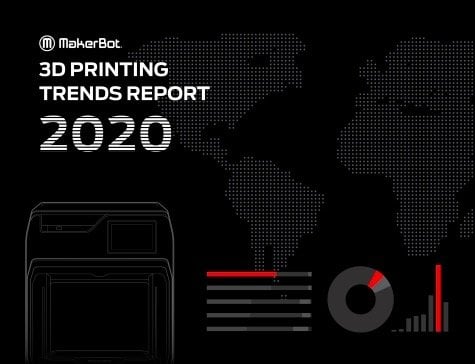New MakerBot Report Reveals 74% of Companies Plan to Invest in 3D Printing in 2021
Findings from inaugural report signal mounting confidence in 3D printing’s ability to transform business operations. Over half of survey respondents plan to invest up to $100,000 in 3D printing technologies next year.

3D Printing Trends Report, which includes over 1,200 responses from professionals across multiple industries, including Aerospace, Industrial Goods, Military & Defense. Medical, and Automotive. Key findings in the report reveal that nearly three-quarters (74%) of respondents are planning to invest in 3D printing technology in 2021, with 50% planning to spend up to $100,000.
“These findings confirm what we have known for some time – and that is the potential of 3D printing to transform business operations,” said Nadav Goshen, CEO, MakerBot. “When faced with the kind of challenges that businesses have had to contend with over the last 12 months, it is not unusual to see them cut all but the most critical capital expenditure. However, this is clearly not the case with 3D printing.
While COVID-19 impacted the business operations of nearly 70% of the respondents, 56% said that it did not impact their investment plans in 3D printing. In fact, when respondents were asked what their investment plans were for next year, 74% stated that they still had plans to invest in 3D printing. This is an incredibly positive response which, we believe, signals growing confidence in 3D printing’s ability to improve resilience, responsiveness and, ultimately, the profitability of business operations.”
Other key findings of the MakerBot 3D Printing Trends Report include:
- Customization is the number one reason respondents use 3D printing. Respondents wanted the ability to create custom, low-to-mid-volume production parts (68%) and print complex geometries (57%).
- However, 3D printing continues to play a much bigger role in the research and design phases. Concept modeling (70%), functional prototypes (66%), and research and development (44%) were the main applications for respondents.
- Print quality and printer performance are top factors when choosing a 3D printer. A printer is only as good as its 3D-printed parts. Respondents stated that dimensional accuracy (61%) and reliability (65%) are the top factors influencing their printer selections.
- FDM® 3D printers are king. While there are a variety of 3D printing technologies, FDM remains the most frequently used. The majority of respondents (77%) use FDM/FFF 3D printers in their repertoire, while 27% use SLA technology. Unsurprisingly, plastics (93%) and resins (25%) were the main materials used.
- Costs and technical expertise are major barriers to implementing 3D printing. 53% of respondents say that lack of budget is preventing them from fully utilizing 3D printing, while 29% cite lack of technical expertise.
- Respondents expect the technology, materials, and applications to develop over the next 3-5 years. 61% of respondents expect more materials to emerge, while 58% expect the cost of using the technology to decrease.
“We are pleased to release the MakerBot 3D Printing Trends Report, our first report on the trends and factors that are impacting the use of 3D printing. 3D printing has come a long way since the early days of the technology in the 1980s. But as the technology moves from prototyping to production, we expect to see the expansion of its use and applications continue to grow at an exponential rate. As a supplier, we believe it is our responsibility to look at these behaviors to better understand the needs of users and, thus, be able to deliver better products and services,” added Goshen.
www.stratasys.com

